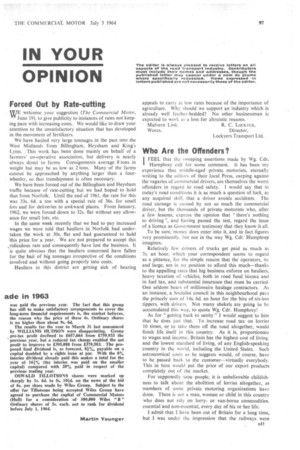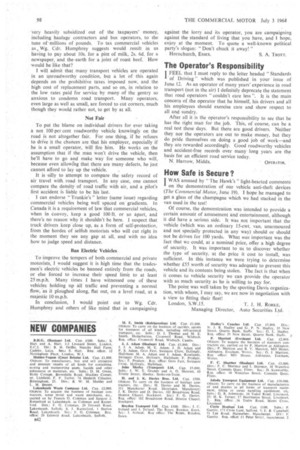IN YOUR OPINION
Page 99

Page 100

If you've noticed an error in this article please click here to report it so we can fix it.
Forced Out by Rate-cutting
wE welcome your suggestion (The Commercial Motor, " June 19), to give publicity to instances of rates not keeping pace with increasing costs. We would like to draw your attention to the unsatisfactory situation that has developed in the movement of fertilizers.
We have hauled very large tonnages in the past into the West Midlands from Billingham, Heysham and King's Lynn. This work has been done mainly on behalf of a farmers co-operative association, but delivery is nearly always direct to farms Consignments average 8 tons in weight but may be as low as 2 tons. Many of the farms cannot be approached by anything larger than a fourwheeler, so that transhipment is often necessary.
We have been forced out of the Billingham and Heysham traffic because of rate-cutting but we had hoped to hold that from Norfolk. Until the end of 1961, the rate for this was 33s. 6d. a ton with a special rate of 36s. for small lots and for deliveries to awkward places. From January, 1962, we were forced down to 32s. flat without any allowance for small lots, etc.
In the same week recently that we had to pay increased wages we were told that hauliers in Norfolk had undertaken the work at 30s, flat and had guaranteed to hold this price for a year. We are not prepared to accept this Jidiculous rate and consequently have lost the business. It is quite obvious that the hauliers concerned have fallen for the bait of big tonnages irrespective of the conditions involved and without going properly into costs.
Hauliers in this district are getting sick of hearing appeals to carry at low rates because of the importance of agriculture. Why should we support an industry which is already well feather-bedded? No other businessman is expected to work at a loss for altruistic reasons.
Malvern Link. R. C. LOCKYER,
Worcs. Director, Lock yers Transport Ltd.
Who Are the Offenders?
I FEEL that the sweeping assertions made by Wg. Cdr. I Humphrey call for some comment. It has been my experience that middle-aged private motorists, eternally writing to the editors of their local Press, carping against the vagaries of commercial drivers, are themselves the worst offenders in regard to road safety. I would say that in today's road conditions it is as much a question of luck, as any acquired skill, that a driver avoids accidents. The road carnage is caused by not so much the commercial driver, but the thousands of private motorists who, after a few lessons, express the opinion that "there's nothing to driving ", and having passed the test, regard the issue of a licence as Government testimony that they know it all.
To be sure, money does enter into it, and in fact figures very prominently. hut not in the way Wg. Cdr. Humphrey imagines.
Relatively few drivers of trucks get paid as much as 7s. an hour, which your correspondent seems to regard as a pittance, for the simple reason that the operators, by and large, are in no position to afford this much—thanks to the appalling rates that big business enforce on hauliers, heavy taxation of vehicles, both in road fund licence and in fuel tax, and substantial insurance that must be carried. One seldom hears of millionaire haulage contractors. As an instance, a Socialist council in this neighbourhood pays the princely sum of 14s. bd. an hour for the hire of six-toll tippers, with drivers. Not many shekels are going to be accumulated this way, to quote Wg. Cdr. Humphrey?
As for "getting back to sanity" I would suggest to him that he does just that. To increase road tax on lorries 10 times, or to take them off the road altogether, would finish life itself in this country. As it is, proportionate to wages and income, Britain has the highest cost of living, and the lowest standard of living, of any English-speaking country in the world, including the United States. Such astronomical costs as he suggests would, of course., have to be passed back to the customer—virtually everybody. This in turn would put the price of our export products completely out of the market.
For supposedly sane people, it is unbelievable childishness to talk about the abolition of lorries altogether, as members of sonic private motoring organizations have done. There is not a man, woman or child in this country who does not rely on lorryor van-borne commodities, essential and non-essential, every day of his or her life.
I admit that I have been out of Britain for a long time, but I was under the impression that the railways were
very heavily subsidized out of the taxpayers' money, including haulage contractors and bus operators, to the tune of-millions of pounds. To tax commercial vehicles as „ Wg., Cdr. Humphrey suggests would result in us having to pay about 10s. for a pint of milk, 2s. 6d. for a newspaper, and the-earth for a joint of roast beef. How 'would he like that?
I will admit that many transport vehicles are operated in an unroadworthy condition, but a lot of this again depends on the prohibitive taxes imposed now, and the high cost of replacement parts, and so on, in relation to the low rates paid for service by many of the gentry so anxious to condemn road transport. Many operators, even large as well as small, are forced to cut corners, much though they would rather not, to get by at all.
Not Fair To put the blame on individual drivers for ever taking a not 100 per cent roadworthy vehicle knowingly on the road is not altogether fair. For one thing, if he refuses to drive it the chances are that his employer, especially if he is a small operator, will fire him. He works on the assumption that if the man won't drive the vehicle, then he'll have to go and make way for someone who will, because even allowing that there are many defects, he just cannot afford to lay up the vehicle.
It is .silly to attempt to compare the safety record of air travel with roadtransport. In any case, one cannot compare the density of road traffic with air, and a pilot's first accident is liable to be his last.
I can endorse " Trunkie's " letter (same issue) regarding commercial vehicles being well spaced on gradients. In Canada it is a requirement of law that commercial vehicles, when in Convoy, keep a good 100 ft. or so apart, and there's no reason why it shouldn't be here. 1 suspect that truck drivers keep close up, as a form of self-protection, from the hordes of selfish motorists who will cut right in the moment they see any gap at all, and with no idea how to judge speed and distance.
Ban Electric Vehicles
To improve the tempers of both commercial and private motorists, I would suggest it is high time that the tradesmen's electric vehicles be banned entirely from the roads, or else forced to increase their speed limit to at least 25 m.p.h. Many times I have witnessed one of these vehicles holding up all traffic and preventing a normal flow, as it ploughed along, flat out, on a level road, at a majestic 10 m.p.h.
In conclusion, I would point out to Wg. Cdr. Humphrey and others of like mind that in campaigning
against the lorry and its operator, you are campaigning against the standard of living that you have, and I hope, enjoy at the moment. To quote a well-known political party's slogan: "Don't chuck it away!"
Hornchurch, Essex. S. A. TBorr.
The Operator's Responsibility
FEEL that I must reply to the letter headed "Standards I of Driving" which was published in your issue of June 12. As an operator of many years' experience in road transport (not in the air) I definitely deprecate the statement that road operators "couldn't care less ". it is the main concern of the operator that he himself, his drivers and all his employees should exercise care and show respect to all and sundry.
After all it is the operator's responsibility to see that he has the right man for the job. This, of course, can be a real test these days. But there are good drivers. Neither they nor the operators are out to make money, but they
do pride themselves on doing a good job of work—and•they are rewarded accordingly. Good roadworthy vehicles
and accident-free records over many long years are the basis for an efficient road service today.
N. Harrow, Middx. OPERATOR.
How Safe is Secure ?
I WAS amused by "The Hawk's" light-hearted comments I on the demonstration of our vehicle anti-theft devices (The Commercial Moior, June 19). I hope he managed to get a glass of the champagne which we had stacked in the van used in the test!
Of course, the demonstration was intended to provide a certain amount of amusement and entertainment, although it did have a serious side. It was not important that the vehicle (which was an ordinary 15-cwt. van, unarmoured and not specially protected in any way) should or should not be driven for 100 yards. What was important was the fact that we could, at a nominal price, offer a high degree of security. It was important to us to discover whether the type of security, at the price it cost to install, was sufficient. In this instance we were trying to determine whether £55 worth of security was adequate to prevent this vehicle and its contents being stolen. The fact is that when it comes to vehicle security we can provide the operator with as much security as he is willing to pay for.
The point was well taken by the sporting Davis organization, with whom, I may say, we are now in negotiation with a view to fitting their fleet!
London, S.W.15. T. J. H. RORKE, Managing Director, Auto Securities Ltd.












































































































































